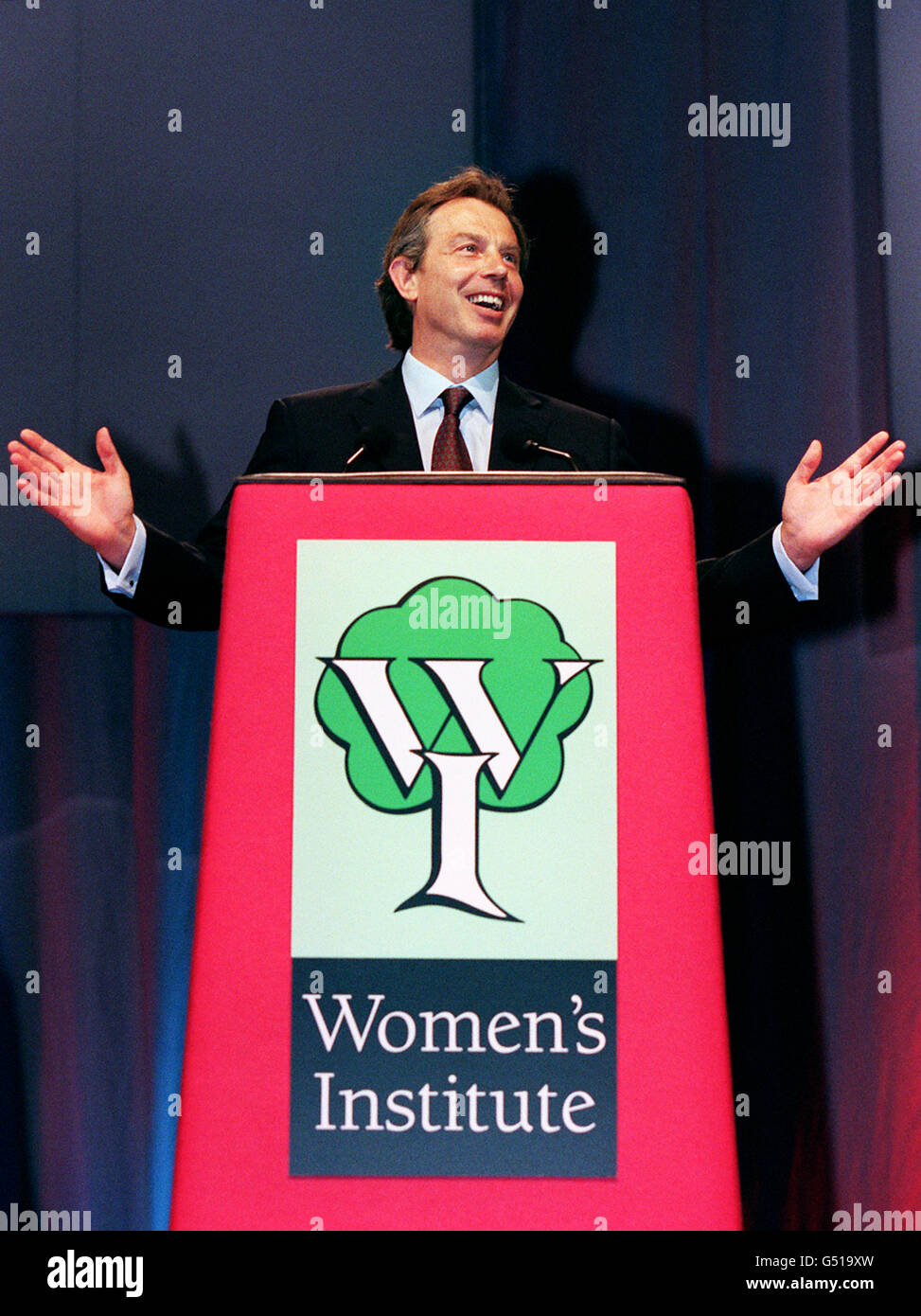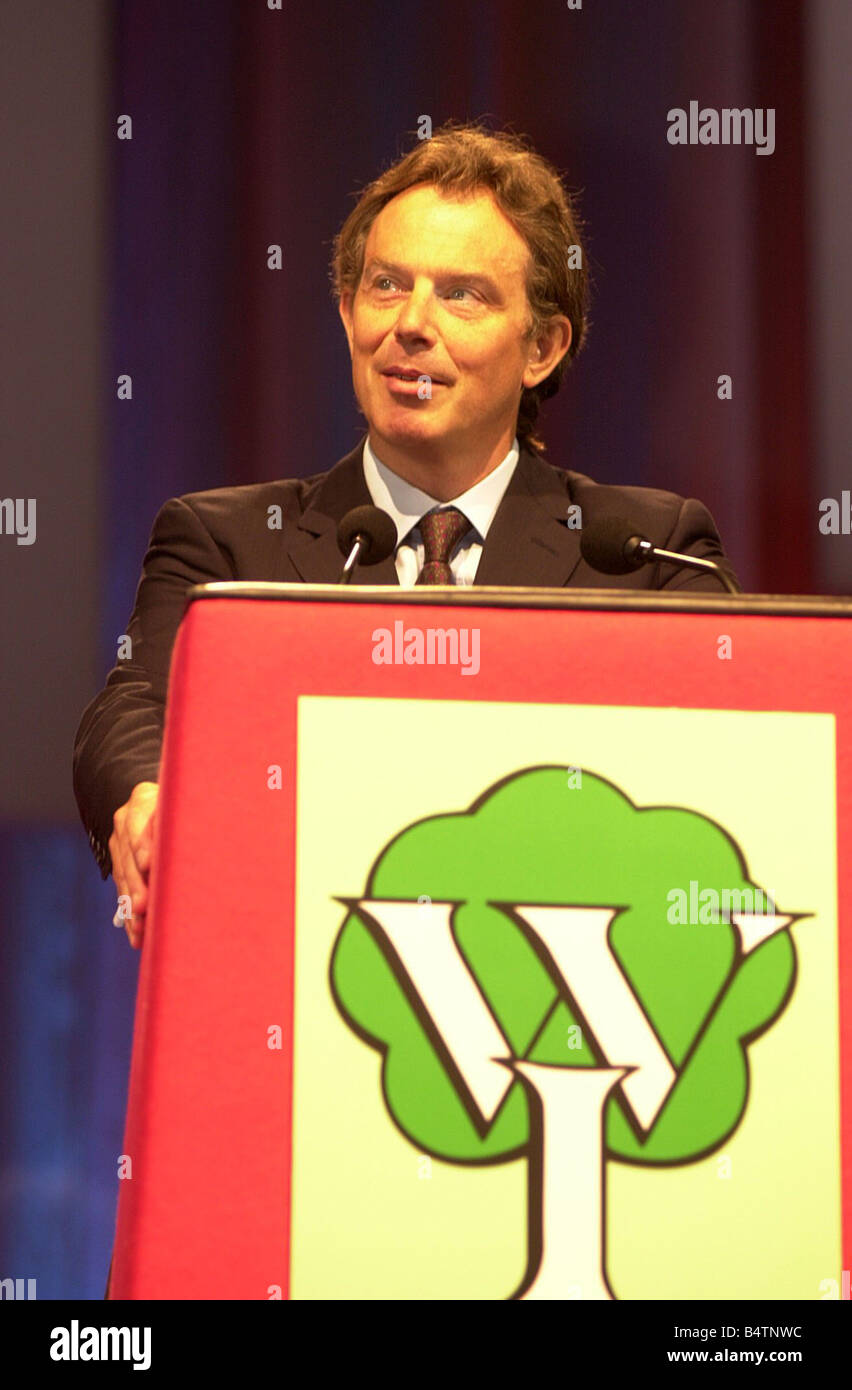Ever witnessed a prime minister facing a frosty reception? The infamous moment when Tony Blair addressed the Women's Institute in June 2000 remains a stark reminder that even the most seasoned politicians can misjudge their audience.
The event, held at the Women's Institute's national conference, drew an audience of approximately 10,000 members. Blair's intention was clear: to regain political momentum from the Conservative party. He hoped his address would resonate with this influential group of women, but the reality unfolded quite differently. Instead of enthusiastic applause, Blair was met with polite, yet lukewarm, acknowledgement, and, in some instances, outright disapproval. The atmosphere was far from the triumphant political rally he envisioned. The Prime Minister's speech, intended to showcase his government's achievements and future vision, was met with a palpable sense of discontent from a significant portion of the assembled members. What exactly transpired in that hall, and what were the underlying reasons for the less-than-cordial reception? It's a story that intertwines political strategy, social dynamics, and the evolving role of women in British society.
| Category | Information |
|---|---|
| Name | Anthony Charles Lynton Blair (Tony Blair) |
| Born | 6 May 1953, Edinburgh, Scotland |
| Education | Fettes College, St John's College, Oxford (BA in Jurisprudence) |
| Political Party | Labour Party |
| Years as Prime Minister | 1997-2007 |
| Key Policies & Achievements | Minimum Wage, Devolution, Good Friday Agreement, Military interventions in Kosovo, Sierra Leone, and Iraq. |
| Post-Premiership Roles | Middle East Envoy, Founder of the Tony Blair Institute for Global Change |
| Spouse | Cherie Blair |
| Children | Euan, Nicholas, Kathryn, Leo |
| Official Website | Tony Blair Institute for Global Change |
The scene inside the conference hall was captured in various media formats. Reports from the day describe a palpable tension as Blair addressed the audience. Some attendees engaged in "slow handclapping," a clear sign of disapproval, while others remained silent and unimpressed. Visual accounts depicted Blair on stage, attempting to connect with an audience that seemed resistant to his message. Outside the hall, vox pops captured the mixed reactions of the Women's Institute members, with some expressing disappointment and others defending their right to express their opinions. This event, more than just a minor public relations setback, offered a glimpse into the complex relationship between the government and the diverse communities it sought to represent.
- Girls Mary Jane Shoes Styles Deals Youll Adore
- Ashley Isaacs Ed Concerns Amp Reugeniacooneys Shocking Views
The Women's Institute, formed in 1915, initially aimed to revitalize rural communities and empower women in food production during World War I. Originating in Canada, the organization quickly spread to the United Kingdom, establishing its first branch in a garden shed in Llanfairpwllgwyngyll, Wales. Over the decades, the Women's Institute's mandate evolved. It broadened its focus to encompass a wide array of social, educational, and community-based activities. The organization became known for its diverse range of programs, from traditional crafts and cookery to contemporary issues such as environmental conservation and social justice. The WI became the largest voluntary women's organization in the UK, boasting a membership of over 290,000 women across thousands of local branches.
By June 2000, the Women's Institute had transformed into a powerful voice for women across the country. Its members came from diverse backgrounds and held a wide range of political views. While the organization traditionally maintained a non-partisan stance, its members were engaged and informed citizens with strong opinions on the issues of the day. The WI had evolved far beyond its "jam and Jerusalem" image, becoming a force for social change and a platform for women to advocate for their communities. This transformation made the WI an important demographic to engage with, and likely contributed to Blair's decision to address their national conference.
Tony Blairs decision to speak before the Womens Institute was undoubtedly a calculated political move. His government, while popular, faced growing criticism on various fronts. Addressing such a large and influential womens organization presented an opportunity to connect directly with a key demographic and potentially sway public opinion. Blair likely hoped to showcase his governments achievements in areas of particular concern to women, such as education, healthcare, and family support. He might have also aimed to portray a more approachable and relatable image, softening his political persona and building trust with an audience known for its down-to-earth values. However, this strategy carried significant risk. Misjudging the mood of the audience could backfire, turning a potential triumph into a public relations disaster. Some speculate that Blair underestimated the WI members' political awareness and independent thinking, assuming they would be easily swayed by his charismatic rhetoric. Others believe that his policy positions on certain issues, such as the Iraq War, alienated a significant portion of the audience.
- Jordyn Woods Style Evolution From Nyfw To Fur Coats Beyond
- La Quinta Inn Johnson City Your Guide To Amenities More
The speech itself did not appear to resonate with the audience. Reports indicate that Blair attempted to connect with the WI members through humor and personal anecdotes. He even jokingly remarked about the "terrifying" nature of the audience, seemingly attempting to disarm any potential hostility. However, his attempts at lightheartedness were met with polite, but restrained, laughter. When he moved on to discuss government policies, his arguments failed to garner enthusiastic support. Many members felt that his speech lacked substance and failed to address their specific concerns. There was a sense that Blair was talking "at" them, rather than engaging in a genuine dialogue. The disconnect between Blair's message and the audience's expectations contributed to the overall sense of disappointment and disapproval.
The fallout from the Women's Institute address was immediate and widespread. Media outlets seized on the story, portraying it as a major public relations blunder for the Prime Minister. Political commentators dissected Blair's performance, questioning his judgment and communication skills. The incident fueled criticism from opposition parties, who saw it as evidence of Blair's declining popularity and disconnect from ordinary voters. The Women's Institute debacle became a symbol of the challenges Blair faced in maintaining public support and navigating the complexities of British politics. The event served as a cautionary tale for politicians seeking to connect with diverse audiences, highlighting the importance of understanding their values, concerns, and expectations.
Interestingly, the "Women's Institute debacle" had an unforeseen positive impact on the WI itself. The media attention surrounding the event propelled the organization into the national spotlight. The WI seized this opportunity to showcase its diverse range of activities and its commitment to empowering women and strengthening communities. The incident helped to shed the organization's outdated "jam and Jerusalem" image, presenting a more contemporary and relevant picture to the public. Membership numbers increased as women sought to join an organization that was actively engaged in important social and political issues. The Blair incident, while embarrassing for the Prime Minister, proved to be a turning point for the Women's Institute, helping it to revitalize its image and expand its influence.
The incident also underscored the importance of knowing your audience. Blair's experience at the WI highlighted the risks of making assumptions about a group's values and beliefs. Politicians must carefully research and understand their audience's concerns and expectations before delivering a speech or engaging in public dialogue. A failure to do so can lead to miscommunication, alienation, and ultimately, a public relations disaster. The WI event served as a valuable lesson for politicians and public figures seeking to connect with diverse communities. Effective communication requires empathy, understanding, and a genuine willingness to listen to and address the concerns of the audience.
Furthermore, certain details, such as Blair's accent, were brought into question. Though originally from Scotland, Blair typically speaks with Received Pronunciation (RP) English. Any deviation from this, even subtle, could be interpreted in various ways by a discerning audience. Bertie Carvel, known for portraying Blair, is himself from London, highlighting the importance of nuanced performance and accent work when depicting public figures. These seemingly minor details contribute to the overall perception and reception of a public figure's message.
The Tony Blair Institute for Global Change, founded after his time as Prime Minister, continues to operate as a significant entity. Registered in England and Wales, the institute focuses on various global challenges. While seemingly unrelated to the WI event, it underscores Blair's continued involvement in public life and his commitment to addressing important issues on a global scale. One might even argue that the lessons learned from the WI event, namely the importance of understanding diverse perspectives, have informed his work at the institute.
Beyond the political ramifications, the incident touches on broader themes of cultural identity and social change. The Women's Institute, from its inception, has played a crucial role in shaping the lives of women in the UK. Its evolution from a focus on wartime food production to a platform for social activism reflects the changing roles and expectations of women in society. The encounter between Tony Blair, a symbol of modern British politics, and the Women's Institute, an organization rooted in tradition and community, highlights the complex interplay between these forces. It serves as a reminder that even in an era of globalization and rapid technological change, local communities and grassroots organizations continue to play a vital role in shaping the social and political landscape.
The date June 6, 2018, and the subsequent update on October 9, 2020, likely refer to an online article or commentary reflecting on the Tony Blair-Women's Institute event. The "cancel email," "link share," "share bookmark," and "save share" options suggest this is an online piece intended for sharing and discussion. These details underscore the enduring relevance of the event and its continued presence in the public consciousness.
In 1938, the British government recognized the importance of the Women's Institute by enlisting its help in preparing for the potential evacuation of children to the countryside in the event of war. This demonstrates the WI's long-standing role as a trusted and influential organization within British society. The institute's ability to mobilize its extensive network of members and provide practical support made it an invaluable asset during times of crisis. This historical context further underscores the significance of the Blair incident, highlighting the WI's enduring importance and its role as a voice for women across the country.
In conclusion, the Tony Blair speech to the Women's Institute remains a compelling case study in political miscalculation and the evolving role of women in British society. What initially appeared to be a simple speaking engagement transformed into a defining moment for both the Prime Minister and the Women's Institute. The incident served as a reminder of the importance of understanding one's audience, the enduring power of grassroots organizations, and the complexities of navigating the ever-changing political landscape.
- Paul Sweet Oval Your Guide To Unhs Indoor Track More
- Gwen Stefanis Hilarious Tonight Show Moments Mustsee Videos


